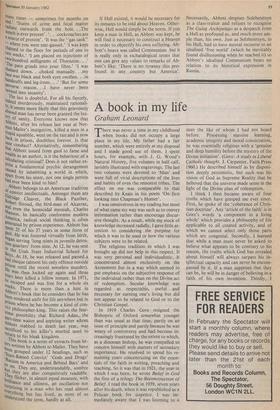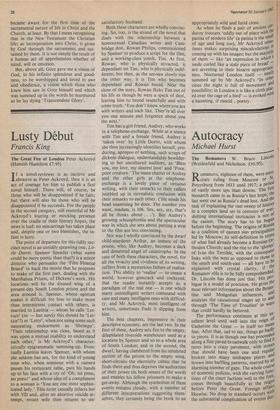A book in my life
Graham Leonard
There was never a time in my childhood when books did not occupy a large place in my life. My father had a fair number, which were entirely at my disposal and 1 made good use of them. I spent hours, for example, with J. G. Wood's Natural History, live volumes in half calf, lavishly illustrated with engravings. The last two volumes were devoted to 'Man' and were full of vivid descriptions of the lives and habits of even the remotest tribes. The effect on me was comparable to that described by Keats in his poem 'On first looking into Chapman's Homer'.
I was omnivorous in my reading but most of what came my way was such as to convey information rather than encourage discur- sive thought. As a result, while my stock of knowledge increased radidly, I gave little at- tention to considering the purpose for which it was to be used or how the various subjects were to be related.
The religious tradition in which I was brought up did not help in this respect. It was very personal and individualistic. It concentrated almost exclusively on the Atonement but in a way which seemed to put emphasis on the subjective response of the individual rather than on the Divine act of redemption. Secular knowledge was regarded as respectable, useful and necessary for earning one's living but did not appear to be related to God or to the Christian Gospel.
In 1919 Charles Gore resigned the Bishopric of Oxford somewhat younger than was usual at that time, partly on an issue of principle and partly because he was weary of controversy and had become in- creasingly frustrated by the extent to which, as a diocesan bishop, he was compelled to concern himself with matters of secondary importance. He resolved to spend his re- maining years concentrating on the essen- tials of the faith in writing, preaching and teaching. So it was that in 1921, the year in which I was born, he wrote Belief in God the first of a trilogy The Reconstruction of Belief. I read the book in 1939, seven years after his death, when it was republished as a Pelican book for sixpence. I was im- mediately aware that I was listening to a
man the like of whom I had not heard before. Possessing massive learning, academic integrity and moral consecration, he was essentially religious with a 'genuine and deep humility before the mystery of the Divine initiation'. (Gore: A study in Liberal Catholic thought. J. Carpenter. Faith Press 1960.) He described himself as by disposi- tion deeply pessimistic, but such was his vision of God as Supreme Reality that he believed that the universe made sense in the light of the Divine plan of redemption.
I think I then became aware of four truths which have grasped me ever since. First, he spoke of the 'coherence of Chris- tian doctrine'. Any 'article of the faith' is in Gore's words 'a component in a living whole' which provides a philosophy of life applicable to all created activity, and of which we cannot select only those parts which are congenial. Secondly, I learned that while a man must never be asked to believe what appears to be contrary to his reason, the truths which God has revealed about himself will always surpass his in- tellectual capacity and can never be encom- passed by it. If a man supposes that they can be, he will be in danger of believing in a faith of his own invention. Thirdly, 1 became aware for the first time of the sacramental nature of life in Christ and the Church, at least. By that I mean recognising that in the New Testament the Christian life; as incorporation into Christ, is given by God through the sacraments and sus- tained by them. It is not simply the result of a human act of apprehension whether of mind, will or emotion.
But, above all, Gore gave me a vision of God, in his infinite splendour and good- ness, to be worshipped and loved in awe and obedience, a vision which those who knew him saw in Gore himself and which was summed up in the words he murmured as he lay dying 'Transcendent Glory'.



































 Previous page
Previous page